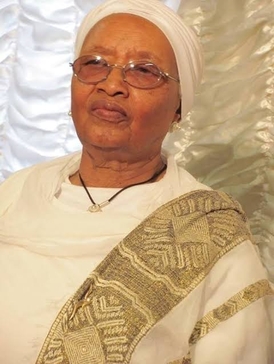
Kipchoge Hezekiah Keino is a retired Kenyan track and field athlete. He was the chairman of the Kenyan Olympic Committee (KOC) until 29 September 2017. A two-time Olympic gold medalist, Keino was among the first in a long line of successful middle and long distance runners to come from the country and has helped and inspired many of his fellow countrymen and women to become the athletics force that they are today. In 2000, he became an honorary member of the International Olympic Committee (IOC). In 2012, he was one of 24 athletes inducted as inaugural members of the IAAF Hall of Fame.

An orphanage is a residential institution, total institution or group home, devoted to the care of orphans and children who, for various reasons, cannot be cared for by their biological families. The parents may be deceased, absent, or abusive. There may be substance abuse or mental illness in the biological home, or the parent may simply be unwilling to care for the child. The legal responsibility for the support of abandoned children differs from country to country, and within countries. Government-run orphanages have been phased out in most developed countries during the latter half of the 20th century but continue to operate in many other regions internationally. It is now generally accepted that orphanages are detrimental to the emotional wellbeing of children, and government support goes instead towards supporting the family unit.

Eldoret is a principal town in the Rift Valley region of Kenya and serves as the capital of Uasin Gishu County. The town was referred to by white settlers as Farm 64 and colloquially by locals as 'Sisibo'. As per the 2019 Kenya Population and Housing Census, Eldoret is the fifth most populated urban area in the country after Nairobi, Mombasa, Nakuru and Ruiru. Lying south of the Cherangani Hills, the local elevation varies from about 2,100 metres (6,900 ft) at the airport to more than 2,700 metres (8,900 ft) in nearby areas. The population was 289,380 in the 2009 Census, and it is currently the fastest growing town in Kenya with 475,716 people according to 2019 National Census. Eldoret was on course to be named Kenya's fourth city, but was edged out by Nakuru in 2021.

Lake Naivasha is a freshwater lake in Kenya, outside the town of Naivasha in Nakuru County, which lies north west of Nairobi. It is part of the Great Rift Valley. The name derives from the local Maasai name ɛnaɨpɔ́sha , meaning "that which heaves," a common Maasai word for bodies of water larger enough to have wave action when it is windy or stormy. Naivasha arose as the British attempt to pronounce the Maasai name. Literally, Lake Naivasha means "Lake Lake."

Kitale is an agricultural town in the northern Rift Valley, situated between Mount Elgon and the Cherangany Hills.The town has an elevation of around 1,900 metres (6,200 ft) Its population is 162,174 as of 2019. Kitale is the headquarter town of Trans-Nzoia County. Kitale is reachable by air through Kitale Airport. The postal code for Kitale is 30200.
Noah Kiprono Ngeny is a Kenyan former athlete, Olympic gold medalist at 1500 m at the 2000 Summer Olympics, and world record holder in the 1000 m.

Uasin Gishu County is one of the 47 counties of Kenya located in the former Rift Valley Province. Eldoret has the county's largest population centre as well as its administrative and commercial centre. “It lies between longitudes 34 degrees 50’ east and 35 degrees 37’ West and latitudes 0 degrees 03’ South and 0 degrees 55’ North. It is a highland plateau with altitudes falling gently from 2,700 meters above sea level to about 1,500 meters above sea level. The topography is higher to the east and declines gently towards the western border”.

Benjamin Wabura Jipcho was a track and field athlete from Kenya, who won the silver medal in the 3000 metres steeplechase at the 1972 Summer Olympics, behind teammate Kipchoge Keino.

Nandi County is a county in Kenya in the North Rift, occupying an area of 2,884.4 square kilometres. Its capital, Kapsabet, is the largest town in the county while other towns include Mosoriot, Tinderet, Kobujoi, Kaiboi, Kabiyet and Nandi Hills. According to a 2019 census, the county had a population of 885,711, made up of a number of Kenyan communities, the majority of whom belong to the native tribe called Nandi.
Kipchoge Keino Stadium is a multi-use stadium in Eldoret, Kenya. It is named after the athlete Kipchoge Keino. It holds 10,000 people.

The men's 1500 metres event at the 1968 Summer Olympics in Mexico City was held on 18 to the 20 of October. Fifty-four athletes from 37 nations competed. The maximum number of athletes per nation had been set at 3 since the 1930 Olympic Congress. The event was won by Kenyan Kip Keino, who beat World record holder Jim Ryun, who struggled to adapt to the altitude of Mexico City. It was the first medal for Kenya in the 1500 metres. Ryun's silver was the United States's first medal in the event since 1952. Bodo Tümmler took bronze, the first medal for West Germany as a separate nation.
The Tuskys Wareng Cross Country is an annual cross country running competition that takes place in November near Eldoret in Kenya. The name is derived from the sponsor, Tuskys Supermarket, which is based in Wareng County.

Msizi Africa is an international charitable organisation set up by Lucy Caslon in 2007. Msizi means 'helper' in Zulu. The charity, based in South London and originally named Mants'ase Children's Home UK, is registered with the UK Charity commission and provides children in Lesotho with nutritious food. Msizi Africa actively supports and closely works with a number of local projects and collaborates with Letsema, a network of service providers working with orphans and vulnerable children in Lesotho. Since October 2015, Msizi Africa Lesotho has been registered as a Lesotho registered charitable organisation.
The Shoe4Africa 5 km is an annual women's road running event over five kilometres that is held on Christmas Eve in the village of Iten, Kenya.
The Academic Model Providing Access to Healthcare (AMPATH) is an academic medical partnership between leading North American academic health centers, primarily led by the Indiana University School of Medicine in Indianapolis, Indiana, and the Moi University School of Medicine based in Eldoret, Kenya. It is the first integrated healthcare model to be established in Africa, encompassing both medical treatment and pharmaceutical provisions. The program aims to deliver comprehensive HIV care services and is guided by a three-fold mission: providing care, conducting research, and offering training opportunities. Currently, AMPATH serves a population of 3.5 million individuals, operating over 60 clinics in urban and rural areas of Western Kenya.

Abebech Gobena was an Ethiopian humanitarian, and the founder and manager of AGOHELMA, one of the oldest orphanages in Ethiopia. She was often called the "Mother Teresa of Africa".

Rift Valley United Football Club is an association football club based in Eldoret, Kenya. The club currently competes in the Kenyan National Super League, and was known as Hotsprings Football Club until 31 March 2014.

The Howard Colored Orphan Asylum was one of the few orphanages to be led by and for African Americans. It was located on Troy Avenue and Dean Street in Weeksville, a historically black settlement in what is now Crown Heights, Brooklyn, New York City. The asylum gradually deteriorated due to lack of funding, and closed in 1918 after an incident involving burst water pipes, which resulted in two students contracting frostbite and having their feet amputated.
Anna Merz was an English conservationist who established the Ngare Sergoi Rhino Sanctuary in 1983. She postponed her retirement in Kenya in 1976 to take up the task of saving black rhinoceroses from poachers wanting to slaughter them for their horns. In 1990, Merz was named to the Global 500 Roll of Honour by the United Nations Environment Programme. Following her death, a female rhinoceros calf was named Anna after her and two fictional books about Merz and a rhinoceros named Samia were published in the late 2010s.












